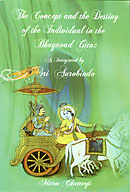
Book: The Concept and the Destiny of the Individual in the Bhagavad Gita (As Interpreted by Sri Aurobindo) by Mitra Chatterjee
(Publisher: Ritima Banerjee, Kolkata. 195 pp, Rs 150)
The Gita is perhaps one of the most revered of spiritual texts, as it provides guidelines not only for meeting the challenges of and finding solutions to almost all the practical problems of human life, but also for understanding the many philosophical and metaphysical concepts that most of the religious traditions of the world are concerned with. There are many beautiful concepts found in the teachings of the Gita which, when understood properly, bring out the relevance of the text and reveal the immense power of the Gita’s teachings in liberating humanity from its various limitations. Sri Aurobindo considered ‘the message of the Gita to be the basis of the great spiritual movement which has led and will lead humanity more and more to its liberation, that is to say, to its escape from falsehood and ignorance, towards the truth’.
Mostly, those who approach the Gita need the help of commentaries in order to have a clear understanding of the various ideas presented therein. But the number of commentaries on the Gita is huge, and each commentator has a different view to present, especially when it comes to the philosophical and metaphysical concepts. For example, the concepts of Moksha or liberation, Karma or action, Prakriti and Purusha, Avatarhood, rebirth, and the individual soul are a few of the ideas of which one finds many differing interpretations in the available commentaries. There has not been a single commentary, other than Sri Aurobindo’s, that offers an integrated and flawless view of the various concepts of the Gita.
There has always been a need for a comparative study of the commentaries on the Gita with special reference to Sri Aurobindo’s Essays on the Gita. And this need has been partially fulfilled by the recently published book The Concept and the Destiny of the Individual in the Bhagavad Gita: As Interpreted by Sri Aurobindo, written by Dr Mitra Chatterjee. This book offers a genuine understanding of a few key concepts of the Gita in the light of Sri Aurobindo. Significantly, the author has made a sincere attempt to make a comparative study of the interpretations of most of the great scholars from the past, such as Sankara, Ramanuja, Sridhara Swamin, and so on. It becomes clear from this book how the same concept has been interpreted so very differently by various commentators, yet no one has provided satisfactory answers to the questions concerned with the various concepts found in the Gita.
In its presentation, Dr Chatterjee’s book first shows the various views stated by the traditional as well as some of the modern commentators, and the shortcomings thereof. Then the author very convincingly presents her central thesis that the completeness of the Gita’s views on the various concepts discussed here has been beautifully brought out by Sri Aurobindo in his Essays on the Gita.
Dr Chatterjee deals with the concept of Purusha, the concepts of Prakriti and Maya, and the concept of Jiva in the first chapter of the book. The concept of liberation in different systems of philosophy and then in the Gita has been treated in the second chapter, along with the concept of Avatarhood. In Chapter Three she deals with the Karmayoga, Jnanayoga and Bhaktiyoga of the Gita. The final chapter is concerned with the synthesis of the Gita’s triple path of Karma, Jnana and Bhakti in the light of Sri Aurobindo.
The introductory chapter of the book has been drafted brilliantly to provide a clear-cut idea of the whole presentation. The most remarkable part of this section is the precision with which Dr Chatterjee summarizes the views of all the philosophical traditions of India on the concepts of the individual self and its destiny. Personally, I would have appreciated a glossary including brief notes on the several commentators mentioned by the author, and also an index appended to the book. However, this book by Dr Mitra Chatterjee will be of great help to those who are genuinely interested to go deep into the subject of the individual self and its destiny as presented in the Gita and to understand it in the light of Sri Aurobindo in comparison to traditional commentators.
— Sampadananda Mishra
(Sampad is presently working at the Sri Aurobindo Society in Pondicherry. As part of his work he is exploring, through his research, the many wonders and splendours of Sanskrit and sharing these with others through his workshops, lectures, and writings.)
(The Concept and the Destiny of the Individual in the Bhagavad Gita is available at SABDA which also holds the copyright for this review.)





